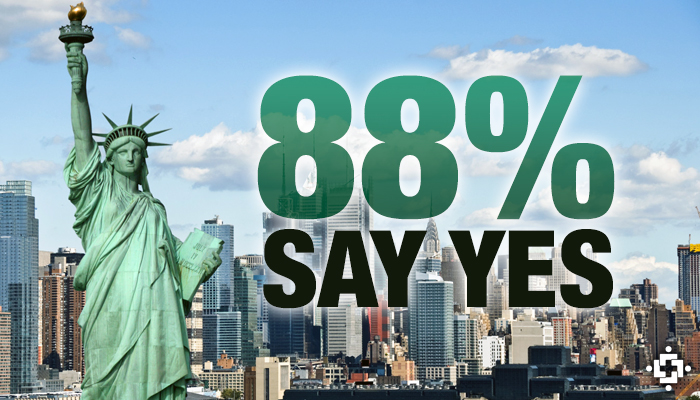
Poll: New York Voters Support Medical Marijuana, Legalizing Cannabis For Adult-Use
ALBANY, NY — Just over a month after Governor Andrew Cuomo announced plans to implement a limited medical marijuana program, a recent poll from Quinnipiac University reveals that such legislation would be welcomed by New York residents.
“Medical marijuana is a no-brainer for New York State voters, and they also would follow Colorado in legalizing marijuana for fun.” – Maurice Carrol
According to the poll results, an overwhelming majority (88%) of New York voters would support medical marijuana legislation in the state. This is compared to just 9% of respondents in opposition.
Furthermore, a slight majority (57%) of those surveyed said they are in favor of legalizing cannabis for adult-use like Colorado and Washington.
Medical Marijuana Is A ‘No-Brainer’ For New York Voters
 Shedding light on the results is Maurice Carrol, director of the Quinnipiac University Polling Institute. “Medical marijuana is a no-brainer for New York State voters, and they also would follow Colorado in legalizing marijuana for fun,” he explains.
Shedding light on the results is Maurice Carrol, director of the Quinnipiac University Polling Institute. “Medical marijuana is a no-brainer for New York State voters, and they also would follow Colorado in legalizing marijuana for fun,” he explains.
Investigating further, we find that a generational gap may exist as far as legalizing cannabis for adult-use is concerned. The poll reveals that 83% of people from 18-29 years old support legalization. The same can said for just 38% of senior citizens (65 and over).
“The poll reveals that 83% of people from 18-29 years old support legalization.”
Also included in the poll was a question about the perceived dangers of cannabis and alcohol, a hot topic since President Obama touched on the subject in an interview with the New Yorker last month.

The poll results show that just 13% of New York voters believe cannabis is more dangerous than alcohol. In comparison, 36% of respondents noted that cannabis is the less dangerous substance. 45% of those polled, however, believe they are equally as dangerous. The Quinnipiac Poll was conducted February 6-10. 1,488 New York State voters were questioned by live interviewers over the phone.